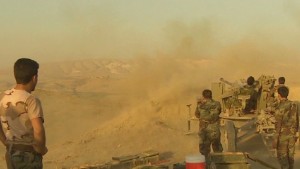Obama, Kerry: No U.S. troops will be sent into combat against ISIS in Iraq, Syria
September 17, 2014 -- Updated 2236 GMT (0636 HKT)
Source: CNN
Speaking at U.S. Central
Command in Florida, Obama said again that U.S. troops "do not and will
not have a combat mission" in Iraq against the Islamic State in Iraq and
Syria.
"After a decade of
massive ground deployments, it is more effective to use our unique
capabilities in support of partners on the ground so they can secure
their own countries' futures," he said. "And that's the only solution
that will succeed over the long term."

General doesn't rule out ground forces

Airstrikes in Syria on the way?
"As your commander in
chief, I will not commit you and the rest of our armed forces to
fighting another ground war in Iraq," Obama told troops at MacDill Air
Force Base in Tampa. Rather, the U.S. forces will support Iraqi forces
on the ground as the Iraqis fight ISIS, he said.
"When we do things alone
and the countries -- the people of those countries -- aren't doing it
for themselves, as soon as we leave, we start getting the same
problems," Obama said.
.
Kerry: 'We will have enough allies'
Obama's position was
reiterated by U.S. Secretary of State John Kerry, who testified before
the Senate Foreign Relations Committee about the administration's plan
to defeat ISIS, the terror group that refers to itself as the Islamic
State.
Kerry also told the senators that a number of countries have agreed to contribute to the fight against the militants.
Asked whether any of the
nations agreed to put boots on the ground to fight ISIS, Kerry said no.
However, Kerry confirmed that some of the countries have committed to
carrying out airstrikes. He did not publicly identify the countries.
"We will have enough allies" for the military action needed to fight ISIS, he said.
Kerry's testimony before
the Senate committee came at the same time the House approved Obama's
request to arm and train Syrian rebels to fight ISIS. The vote was 273
-156, with significant opposition to the proposal in both parties.
The proposal would
authorize the Pentagon to provide assistance to "appropriately vetted"
members of the Syrian opposition and require the administration to give
Congress a detailed plan for helping the rebels before that assistance
could begin.
The Senate vote on the proposal could come as early as Thursday.
During the sometimes
contentious Senate committee hearing, which broke mainly on partisan
lines, Kerry defended the U.S. policy, saying he did not want to
"rehash" debates about the Gulf War and the Iraq War.
"The issue that
confronts us today is one which (all should) be able to agree -- ISIL
must be defeated. Period. End of Story," he said. ISIS is also known as
ISIL.
What that fight will look like is still in question.
Iraq Prime Minister Haider al-Abadi told The Associated Press on Wednesday that foreign troops are "out of the question."
"The only contribution
the American forces or the international coalition is going to help us
with is from the sky," al-Abadi told The AP. "We are not giving any
blank check to the international coalition to hit any target in Iraq."
.
Gen. Martin Dempsey's recommendation
The Prime Minister's
remarks came a day after Gen. Martin Dempsey, chairman of the Joint
Chiefs of Staff, told members of Congress he hasn't ruled out
recommending U.S. ground forces deploy to attack ISIS targets if the
current air campaign in Iraq fails.
"To be clear, if we
reach the point where I believe our advisers should accompany Iraqi
troops on attacks against specific ISIL targets, I will recommend that
to the President," Dempsey said.
The hypothetical remark,
which sources say was vetted by the White House beforehand, managed to
undercut what Obama and his aides have been promising for weeks: that
combat troops were out of the question for Iraq.
The crossed wires come
after a concerted White House effort to spell out a plan against ISIS
terrorists, which itself was a response to the President's frank
admission late last month that he lacked a "strategy" for dealing with
ISIS in Syria.
The vow to keep U.S.
troops out of combat extends as far back as Obama's presidential
campaigns, which were run first on the promise to end the Iraq War, and
four years later on the assurance that that era of American warfare was
over.
While three-quarters of
Americans support airstrikes in Syria and Iraq, a majority still oppose
any combat "boots-on-the-ground" scenario.
.
Obama: training and intelligence-gathering only
When Obama addressed the
nation last week, he made clear the American military advisers being
deployed in Iraq "will not have a combat mission" and would act in a
training and intelligence-gathering capacity only.
"We will not get dragged into another ground war in Iraq," he said in the remarks on September 10.
Officials are adamant
that possibility remains out of the question and say Dempsey's
suggestion was using a hypothetical situation -- a practice rarely seen
at the message-driven White House.
While Dempsey could
recommend deploying U.S. combat forces to Obama, the President will
ultimately make military decisions himself.
"It's the responsibility
of the President's military advisers to plan and consider all the wide
range of contingencies," press secretary Josh Earnest said Tuesday.
"It's also the responsibility of the commander in chief to set out a
clear policy. And the President has been clear about what that policy
is."
A spokesman for Dempsey,
Col. Ed Thomas, said the Joint Chiefs chairman "doesn't believe there
is a military requirement for our advisers to accompany Iraqi forces
into combat."
"The context of this
discussion was focused on how our forces advise the Iraqis and was not a
discussion of employing US ground combat units in Iraq," he wrote in a
statement.
.
Strategy questions
Tuesday isn't the first
time the White House's aim for clarity has fallen short. Obama's frank
admission late last month the United States lacked a "strategy" for
combating ISIS in Syria drew sharp criticism, leading to his eventual
prime-time address announcing the potential for airstrikes in the
country.
The goals cited by the
administration in battling ISIS have similarly drawn some confusion,
going from reducing the force to a "manageable problem" to "degrading
and ultimately destroying" the terrorists.
Opponents of the President quickly accused the administration of muddying the message.
"First of all, the
President is just flat not telling the truth," Sen. James Inhofe,
R-Oklahoma, said on CNN's "The Lead with Jake Tapper."
"We already have boots on the ground there. He knows we have to have boots on the ground. Let's admit we're in a war."

No comments:
Post a Comment